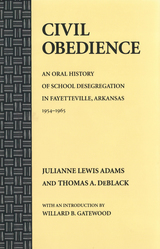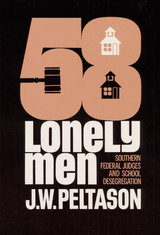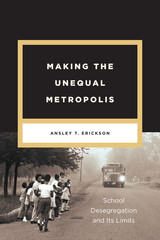4 books about School Desegregation

Civil Obedience
An Oral History of School Desegregation in Fayetteville, Arkansas, 1954–1965
Julianne Lewis Adams
University of Arkansas Press, 1994
Among the many changes that have occurred in our country in the last forty years, few have been as significant as those heralded by the Supreme Court's decision in the Brown vs. Board of Education case in 1954. By declaring racially segregated public schools unconstitutional, the court set in motion forces that resulted in the dismantling of the legal structure of Jim Crowism. The impact of the Brown decision was national in scope, but in no other region was its impact more far-reaching and traumatic than in the South. In Arkansas, as in other Southern states, racial segregation was not merely a well-stablished way of life, it was firmly imbedded in law.
While school desegregation generated much noise and some violence elsewhere in the South, the city of Fayetteville, Arkansas confronted the issue and resolved it with a good deal of dignity and grace, becoming the first Southern city to accommodate the Brown decision.
Through this fascinating collection of interviews with those who were involved in the desegregation process—students, teachers, administrators, civic leaders, and members of local groups—we learn of the determination of citizens to obey the law of the land and to see that freedom and equality took priority over their commitment to a school system that patently discriminated against one group of citizens.
In our continuing efforts to create a society in which all races and cultures can coexist, Civil Obedience is a story worthy of our full attention.
While school desegregation generated much noise and some violence elsewhere in the South, the city of Fayetteville, Arkansas confronted the issue and resolved it with a good deal of dignity and grace, becoming the first Southern city to accommodate the Brown decision.
Through this fascinating collection of interviews with those who were involved in the desegregation process—students, teachers, administrators, civic leaders, and members of local groups—we learn of the determination of citizens to obey the law of the land and to see that freedom and equality took priority over their commitment to a school system that patently discriminated against one group of citizens.
In our continuing efforts to create a society in which all races and cultures can coexist, Civil Obedience is a story worthy of our full attention.
[more]

Fifty-Eight Lonely Men
Southern Federal Judges and School Desegregation
J. W. Peltason
University of Illinois Press, 1971
Originally published in 1961, this still timely book illustrates the role of the judiciary in the solution of a social and political problem. It is unequaled in its description of the plight of federal judges who are charged with carrying out the decisions of the Supreme Court against segregation but who are under constant pressure--social, political, and personal--to speak for the white South. Some have been ostracized by their communities as traitors; others have joined their state legislatures and local school boards in developing elaborate delay strategy to circumvent the Supreme Court's decisions. In his introduction to the first edition former Senator Paul H. Douglas wrote: ". . . a clear and comprehensive account of the legal struggles in the federal courts over segregation and desegregation in the public schools of the nation. It gets behind the newspaper headlines and gives a play-by-play account. . . . This book is indeed full proof of the delays and difficulties of the law and the pressures of local public opinion."
[more]

Making the Unequal Metropolis
School Desegregation and Its Limits
Ansley T. Erickson
University of Chicago Press, 2016
In a radically unequal United States, schools are often key sites in which injustice grows. Ansley T. Erickson’s Making the Unequal Metropolis presents a broad, detailed, and damning argument about the inextricable interrelatedness of school policies and the persistence of metropolitan-scale inequality. While many accounts of education in urban and metropolitan contexts describe schools as the victims of forces beyond their control, Erickson shows the many ways that schools have been intertwined with these forces and have in fact—via land-use decisions, curricula, and other tools—helped sustain inequality.
Taking Nashville as her focus, Erickson uncovers the hidden policy choices that have until now been missing from popular and legal narratives of inequality. In her account, inequality emerges not only from individual racism and white communities’ resistance to desegregation, but as the result of long-standing linkages between schooling, property markets, labor markets, and the pursuit of economic growth. By making visible the full scope of the forces invested in and reinforcing inequality, Erickson reveals the complex history of, and broad culpability for, ongoing struggles in our schools.
Taking Nashville as her focus, Erickson uncovers the hidden policy choices that have until now been missing from popular and legal narratives of inequality. In her account, inequality emerges not only from individual racism and white communities’ resistance to desegregation, but as the result of long-standing linkages between schooling, property markets, labor markets, and the pursuit of economic growth. By making visible the full scope of the forces invested in and reinforcing inequality, Erickson reveals the complex history of, and broad culpability for, ongoing struggles in our schools.
[more]

The Political Use of Racial Narratives
School Desegregation in Mobile, Alabama, 1954-97
Richard A. Pride
University of Illinois Press, 2002
Arguing that politics is essentially a contest for meaning and that telling a story is an elemental political act, Richard A. Pride lays bare the history of school desegregation in Mobile, Alabama, to demonstrate the power of narrative in cultural and political change. This book describes the public, personal, and meta-narratives of racial inequality that have competed for dominance in Mobile. Pride begins with a white liberal's quest to desegregate the city's public schools in 1955 and traces which narratives--those of biological inferiority, white oppression, the behavior and values of blacks, and others--came to influence public policy and opinion over four decades. Drawing on contemporaneous sources, he reconstructs the stories of demonstrations, civic forums, court cases, and school board meetings as citizens of Mobile would have experienced them, inviting readers to trace the story of desegregation in Mobile through the voices of politicians, protestors, and journalists and to determine which narratives were indeed most powerful.
Exploring who benefits and who pays when different narratives are accepted as true, Pride offers a step-by-step account of how Mobile's culture changed each time a new and more forceful narrative was used to justify inequality. More than a retelling of Mobile's story of desegregation, The Political Use of Racial Narratives promotes the value of rhetorical and narrative analysis in the social sciences and history.
[more]
READERS
Browse our collection.
PUBLISHERS
See BiblioVault's publisher services.
STUDENT SERVICES
Files for college accessibility offices.
UChicago Accessibility Resources
home | accessibility | search | about | contact us
BiblioVault ® 2001 - 2024
The University of Chicago Press









